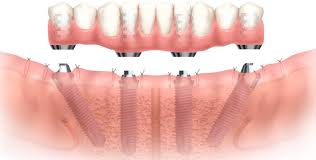Tooth loss can result from decay, gum disease, injury, or genetic conditions. When one or more teeth are missing, it can affect a person’s ability to chew, speak clearly, and smile with confidence. For many years, traditional solutions like dental bridges and dentures were the primary options for replacing missing teeth. Modern dentistry now offers another choice: dental implants.
What Are Dental Implants?
A dental implant is a surgical component that interfaces with the bone of the jaw or skull to support a dental prosthesis such as a crown, bridge, or denture. An implant is typically made of titanium, a material known for its biocompatibility, which means it can fuse with the bone in a process called osseointegration. This fusion creates a strong and stable foundation for a replacement tooth.
The implant itself functions as an artificial tooth root. It is surgically placed into the jawbone where the tooth is missing. The crown is custom-made to match the color, size, and shape of the surrounding natural teeth, resulting in a restoration that looks and feels like a part of your mouth.
What Are They Used For?
Dental implants are a versatile solution for tooth loss and can be used in a variety of situations. They are a common choice for replacing a single missing tooth. In this scenario, one implant is placed into the jawbone, and a single crown is attached to it. This method avoids affecting the adjacent healthy teeth, which would be necessary to support a traditional dental bridge.
Implants can also be used to replace several missing teeth in a row. Instead of placing an implant for every missing tooth, an implant-supported bridge can be created. Two or more implants are placed to serve as anchors for a bridge that spans the gap. This provides a fixed and stable restoration without relying on natural teeth for support.
For individuals missing all of their teeth in an upper or lower arch, implant-supported dentures offer another application. A full denture can be securely attached to a few strategically placed implants. This increased stability can improve chewing ability and speaking.
What Are the Benefits?
When comparing dental implants to traditional options like bridges and dentures, several distinct characteristics emerge. Implants are designed to provide a durable and long-term solution for missing teeth. Because they fuse directly with the jawbone, they create a very stable foundation for replacement teeth that does not move or slip.
Another aspect of dental implants is their effect on surrounding oral structures. Implants do not require modification of neighboring healthy teeth, which preserves their natural structure. The placement of an implant also stimulates the jawbone, similar to a natural tooth root. This stimulation can help to maintain bone density and prevent the bone loss that often occurs when a tooth is missing.
Confer With Your Dentist
Dental implants, bridges, and dentures each have unique features and applications. A thorough discussion with a qualified dental professional is the best way to understand which solution is most appropriate for your specific needs. Your dentist can perform a comprehensive examination, assess your oral health, and explain the details of each available option, allowing you to receive the procedure that will restore your smile.














